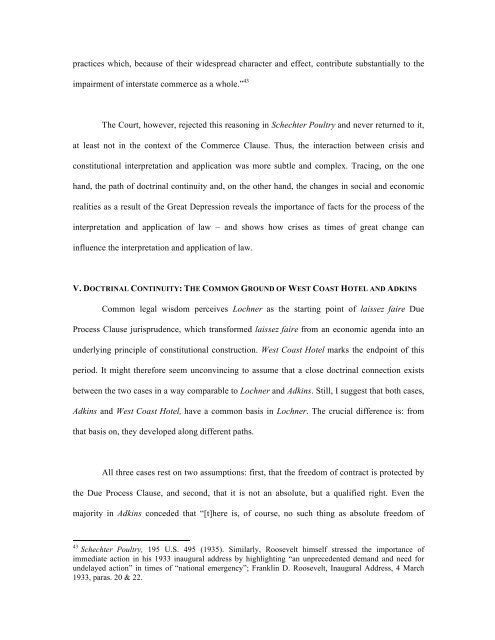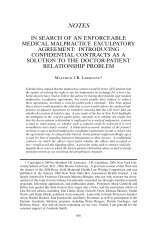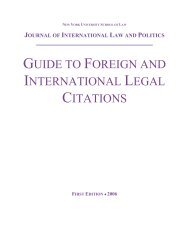Jasper Finke, Crisis and Law - New York University School of Law
Jasper Finke, Crisis and Law - New York University School of Law
Jasper Finke, Crisis and Law - New York University School of Law
Create successful ePaper yourself
Turn your PDF publications into a flip-book with our unique Google optimized e-Paper software.
practices which, because <strong>of</strong> their widespread character <strong>and</strong> effect, contribute substantially to the<br />
impairment <strong>of</strong> interstate commerce as a whole.” 43<br />
The Court, however, rejected this reasoning in Schechter Poultry <strong>and</strong> never returned to it,<br />
at least not in the context <strong>of</strong> the Commerce Clause. Thus, the interaction between crisis <strong>and</strong><br />
constitutional interpretation <strong>and</strong> application was more subtle <strong>and</strong> complex. Tracing, on the one<br />
h<strong>and</strong>, the path <strong>of</strong> doctrinal continuity <strong>and</strong>, on the other h<strong>and</strong>, the changes in social <strong>and</strong> economic<br />
realities as a result <strong>of</strong> the Great Depression reveals the importance <strong>of</strong> facts for the process <strong>of</strong> the<br />
interpretation <strong>and</strong> application <strong>of</strong> law – <strong>and</strong> shows how crises as times <strong>of</strong> great change can<br />
influence the interpretation <strong>and</strong> application <strong>of</strong> law.<br />
V. DOCTRINAL CONTINUITY: THE COMMON GROUND OF WEST COAST HOTEL AND ADKINS<br />
Common legal wisdom perceives Lochner as the starting point <strong>of</strong> laissez faire Due<br />
Process Clause jurisprudence, which transformed laissez faire from an economic agenda into an<br />
underlying principle <strong>of</strong> constitutional construction. West Coast Hotel marks the endpoint <strong>of</strong> this<br />
period. It might therefore seem unconvincing to assume that a close doctrinal connection exists<br />
between the two cases in a way comparable to Lochner <strong>and</strong> Adkins. Still, I suggest that both cases,<br />
Adkins <strong>and</strong> West Coast Hotel, have a common basis in Lochner. The crucial difference is: from<br />
that basis on, they developed along different paths.<br />
All three cases rest on two assumptions: first, that the freedom <strong>of</strong> contract is protected by<br />
the Due Process Clause, <strong>and</strong> second, that it is not an absolute, but a qualified right. Even the<br />
majority in Adkins conceded that “[t]here is, <strong>of</strong> course, no such thing as absolute freedom <strong>of</strong><br />
43 Schechter Poultry, 195 U.S. 495 (1935). Similarly, Roosevelt himself stressed the importance <strong>of</strong><br />
immediate action in his 1933 inaugural address by highlighting “an unprecedented dem<strong>and</strong> <strong>and</strong> need for<br />
undelayed action” in times <strong>of</strong> “national emergency”; Franklin D. Roosevelt, Inaugural Address, 4 March<br />
1933, paras. 20 & 22.
















